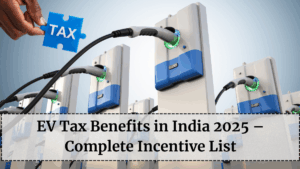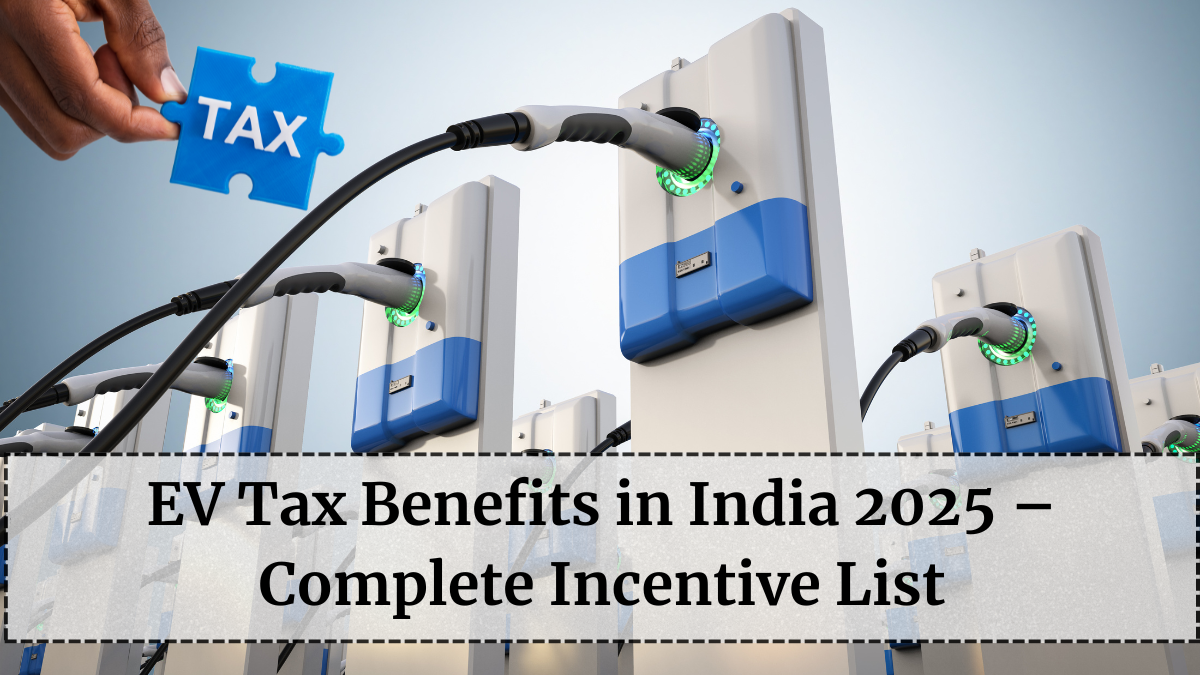Electric vehicles (EVs) are no longer a futuristic concept — they’re a national priority. In 2025, India’s government is doubling down on its mission to accelerate electric mobility, with major updates in tax benefits, subsidies, and financial incentives for EV buyers. From GST reductions to state-specific rebates and income tax deductions, these initiatives are designed to make EVs more affordable than ever before.
Here’s a complete breakdown of all EV tax benefits in India in 2025, including both central and state-level incentives for individuals and businesses.

Central Government EV Incentives in 2025
1. Income Tax Deduction on EV Loans – Section 80EEB
Under Section 80EEB of the Income Tax Act, individuals purchasing an electric vehicle through a loan can claim a deduction of up to ₹1.5 lakh on interest paid.
Key Points:
-
Available for both two-wheelers and four-wheelers.
-
Applicable for loans sanctioned by banks or NBFCs.
-
Valid until March 31, 2025, with possible extension under the new mobility policy.
This makes financing an EV more cost-effective than a conventional petrol or diesel car.
2. Reduced GST on Electric Vehicles
The Goods and Services Tax (GST) on electric vehicles remains at 5%, compared to 28% on petrol and diesel vehicles.
Impact:
This direct reduction lowers on-road prices by thousands of rupees, especially for EVs priced between ₹10–₹20 lakh. Charging equipment also attracts only 5% GST, encouraging home and public charger installations.
3. FAME-II Subsidy Extension (2025 Update)
The Faster Adoption and Manufacturing of Electric Vehicles (FAME-II) scheme continues to support EV adoption in 2025 with new funding allocations and subsidy extensions.
Highlights:
-
Up to ₹15,000 per kWh for electric two-wheelers (limited to 40% of vehicle cost).
-
₹10,000 per kWh for electric four-wheelers used for commercial or fleet purposes.
-
₹20,000 per kWh for electric buses and commercial heavy EVs.
-
Scheme validity extended until March 2026 to support continued adoption.
4. Corporate Tax Benefits for EV Fleets
Businesses investing in electric fleets can claim accelerated depreciation of 40% on EV assets. This reduces taxable income and promotes large-scale adoption of EVs for logistics, delivery, and corporate fleets.
5. Customs Duty Reductions on Components
To promote domestic manufacturing under the Make in India initiative, the government has reduced import duties on EV parts such as batteries, motors, and controllers. This ensures cheaper local production and stable pricing for Indian consumers.
State-Wise EV Incentives and Policies (2025 Update)
Delhi
-
Purchase incentive of ₹10,000 per kWh for four-wheelers and ₹5,000 per kWh for two-wheelers.
-
100% waiver on road tax and registration fees for EVs.
-
Additional benefits for scrapping old vehicles.
Maharashtra
-
Up to ₹2.5 lakh subsidy for electric cars and ₹15,000 for scooters.
-
Incentives for manufacturers setting up EV production units.
-
Toll exemption for EVs on major highways.
Karnataka
-
100% exemption on road tax and registration.
-
Incentives for battery-swapping infrastructure.
-
Subsidies for EV startups under the state’s innovation policy.
Tamil Nadu
-
Road tax and registration fee exemptions for 5 years.
-
Manufacturing incentives under the EV & Battery Policy 2023–2028.
-
Subsidized land rates for EV factories and charging stations.
Gujarat
-
Up to ₹20,000 subsidy for two-wheelers and ₹1.5 lakh for four-wheelers.
-
Road tax and registration fee waivers for early EV buyers.
-
Expansion of public charging infrastructure through PPP models.
Telangana
-
100% road tax exemption and free parking in government areas.
-
₹10 lakh capital subsidy for EV manufacturing startups.
-
EV zones planned in Hyderabad for fleet electrification.
EV Incentives for Businesses and Fleets
Corporate Fleets
Businesses adopting EVs for employee transport or last-mile delivery can avail:
-
Accelerated depreciation under Section 32 of the Income Tax Act.
-
Lower TCO (Total Cost of Ownership) compared to diesel fleets.
-
Green certification benefits under ESG (Environmental, Social, Governance) norms.
Startups and Charging Operators
Startups setting up EV charging stations are eligible for:
-
Capital subsidies under the Energy Efficiency Services Ltd. (EESL) initiative.
-
Low-interest loans from SIDBI and IREDA.
-
100% FDI allowance in the EV and charging sectors.
EV Charging and Infrastructure Benefits
-
Public charging stations benefit from reduced electricity tariffs under state power policies.
-
The National Electric Mobility Mission Plan (NEMMP) supports intercity charging corridors.
-
Residential societies installing shared chargers can claim up to ₹50,000 subsidy through DISCOM-linked programs.
Impact of EV Tax Benefits on Consumers
The combined impact of central and state incentives makes EVs significantly cheaper in 2025. For instance, an electric SUV like the Tata Nexon EV Max priced around ₹18 lakh could see a total effective reduction of ₹3–₹4 lakh when subsidies, tax deductions, and GST savings are applied.
Moreover, with low running costs (₹1 per km vs ₹8–₹10 for petrol cars), the lifetime cost of ownership for EVs is now lower than traditional vehicles, making them a smart long-term investment.
Future Outlook
The government is expected to introduce the FAME-III scheme in 2026 with an emphasis on battery recycling incentives, domestic cell manufacturing, and rural EV adoption. Policies are also aligning with India’s 2070 Net Zero targets, aiming for 30% EV penetration by 2030.
As technology advances and infrastructure scales up, EVs will soon move from being eco-friendly alternatives to the default mode of mobility across India.
FAQs
What is the income tax benefit for EV buyers in 2025?
Buyers can claim up to ₹1.5 lakh deduction on loan interest under Section 80EEB of the Income Tax Act.
Are EVs exempt from road tax and registration?
Yes, several states including Delhi, Karnataka, and Gujarat offer 100% exemption on road tax and registration for EVs.
What is the GST rate on EVs?
Electric vehicles and chargers attract only 5% GST, significantly lower than conventional vehicles.
Are EV subsidies still available under FAME-II in 2025?
Yes, FAME-II continues through 2025 with extended funding and updated per-kWh subsidy rates.
Which states offer the highest EV incentives in India?
Delhi, Maharashtra, and Gujarat currently offer the highest combined EV purchase and registration benefits.
Click here to know more.
